- Home
- Liz Braswell
Unbirthday Page 6
Unbirthday Read online
Page 6
“In about a quarter hour,” he answered.
“Oh, do let me in! I must stop this travesty at once!” she said, desperately putting her hands out to find where the portcullis had hidden itself.
“There’s no use,” the Knave said sadly. “The VIP section is full.”
“But what about standing room?”
“Oh, that’s the first to go so people can make their quota. Also full, obviously.”
“Mezzanine?”
“Filled with ladies of the court, I’m afraid.”
“I am trying to rescue my friends about to be killed. I’m about to commit what you would probably also call treason. And you still insist I need a proper ticket?”
“There’s rules about these things,” he said apologetically.
“I’m afraid I left my gloves under my seat, from yesterday,” Alice said through gritted teeth. “In the excitement and blood I simply forgot. I’ll just nip in and fetch them.”
“Well-behaved girls don’t lie,” the Knave said accusingly.
“Please do not attempt to inform me what well-behaved girls do or don’t do, or assume I am well behaved or wish to be well behaved, or even if I am a girl. I am eighteen now, you know,” Alice said frostily, drawing herself up to her full height, which was still a good deal shorter than the Knave of Accounting. “If being naughty saves the Hatter, I will be the naughtiest, most rascally woman you ever laid your unfortunate eyes on. Now open that door.”
The Knave blinked at her silently for a moment.
Then he buried his face back in the scroll.
“Perhaps there is a rule allowing patrons in to check for Lost Property.”
“Oh, for goodness’ sake. Let me have a look,” Alice said, humphing. And on a whim, perhaps because the Knave seemed to have issues with seeing himself, or because it gave her hands something to do, or maybe it was just an Alice fancy—she would never be able to say for certain later—she pulled out the monocle and popped it in.
“Oh! I didn’t realize you were in Accounting, too!” the Knave cried, looking at her in surprise. He held up a monocle as well—one he didn’t use, apparently. Not as fine-looking as Alice’s, it was trimmed in rusty grey metal and hung on a largish chain. “Or Legal. My apologies. Please allow me. Professional courtesy.”
He swept a bow and at the same time the portcullis appeared, creating itself downward and then drawing itself back up.
“Thank you,” Alice said with as quick a polite curtsy as she could manage. With her head held high—and while trying not to drop the monocle—she went through.
Alice went pale when her mind finally managed to make sense of what it saw.
Half the scene was dreamy Wonderland nonsense. There were bleachers and seats in tiered rows made from all sorts of inappropriate things: a sofa on legs that was in imminent danger of growing bored and walking off with its sitters still on; wicker thrones with silk parasols attached; chairs sat on the wrong way, upside down.
The standing-only area was fenced off with giant wooden forks and should have been as raucous as similar sections in Angleland at cricket matches or political speeches—especially considering the miniature elephants, large-mouthed ants, and strangely shaped humans all pushing each other for a view.
But no matter which tier they were in or what manner of creature they were, the spectators were all—quite rightly—subdued. Unlike Alice’s previous visit, when the Queen had just shouted Off with her head wherever she went—croquet court, alee in the gardens, parade grounds—this was a place that had been custom made for her gruesome orders.
The focus of attention was a large, strange pile that haunted the center of the arena. It was made from rubbish and junk and all the detritus of a fantasy world: teapots and tiny castles, golden eggs and garbage bins, locked trunks and suits of armor that didn’t seem like they were quite emptied out of their owners yet.
Balanced precariously on top of this was a stage stained a different shade of red than the red with which everything else had been painted. Darker. More permanent.
The castle in the background was the same as Alice remembered from her dream, such a dark red as to almost be black, but now it was the tallest thing in any direction of a flattened, red-rubbled land. Ominous black smoke poured out of its loops and murder holes. Everything smelled faintly of burnt tarts.
On a strange little pavilion to the left of the pile was a gigantic puffy red heart. Standing (carefully behind a railing) on the ramparts atop this were a pair of old familiar faces: Tweedledee and Tweedledum. They grinned, their mouths practically splitting their ridiculous faces, and waved to the crowd as if they were the main attraction at the event. Tweedledum wore a giant pin that said BEST BOY. Tweedledee wore a giant pin that said BOY, BEST. Below each of these was a second pin, large and glittery and tacky: a ruby red heart.
“Well,” Alice said to herself, “it’s safe to bet whose side they threw their lots in with. But where is the Queen herself? Shouldn’t she be overseeing this business?”
A horn sounded: a long, beautiful golden horn with red banners trailing from it that would have been achingly lovely had not what it summoned been so horrible.
(Also, it sounded itself; there was no horn player present.)
Prisoners were marched out, bound up and miserably shuffled along by something Alice decided was a kind of ogre, as well as a grumpy-looking elephant who stood on her two hind legs. Alice caught her breath. Hatter, the tiny Dormouse, and the Dodo looked so sad. Not terrified, as she would have expected. Exhausted and dirty and dried-out and somehow ancient, too old for their time. The Hatter gazed at the crowd with a face that didn’t beseech, only wondered why.
Behind them came what had to have been the method of the execution and the executioner all in one: a giant creature with a black hood over its eyes and ears and top of head, its snub-nosed, razor-toothed muzzle wide and ready to snap heads off.
Alongside this gruesome parade came the soldiers. Hundreds of cards marched stock-straight at attention, eyes unreadable and sharpened swords all identically at the ready. Were Alice to charge them, it would be death by a thousand paper cuts.
“Most decks only have fifty cards—fifty-two at the most, surely,” Alice breathed.
“Oh, she’s been building her ranks again, haven’t you heard?” an old gossipy sheep said, shifting her knitting aside to look over her glasses at Alice. She lowered her voice to a raspy whisper. “Playing rummy and a new one called Spite and M’alice to maximize her offense.”
“But where is she? Where is the Queen?”
“Oh, she don’t come to executions anymore. Too many of them,” the sheep sniffed. “I suppose we watch them for her.”
“Is that what it is about, the quota? Does everyone have to be here for a reason?”
“You must be from the Outer Board—or as dumb as a hat on a tove. ’Course we have to be here, at least once a quarter, or it’s treason. Beg pardon now. I don’t want to lose my seat.” The old sheep passed Alice into the middle tier, where she held up a heart-shaped ticket to an anteater usher and was then escorted to a church pew.
“And they all just come and watch the executions?” Alice asked wonderingly.
How on earth would she save her old friends? If the soldiers were countless and the crowd unlikely to rebel, terrified for their own lives, what could she do?
There had to be something. There was always an answer in Wonderland, if you just knew where—or how—to look.
And then she spied it.
In the VIP section was a prettily set table with refreshments for the upper crust. There was tea, punch, tall crystal glasses of what could only have been champagne, delicate sandwiches shaped like hearts, and trays and trays of tarts and biscuits.
(Ironically, the other sections also had food—pie and cider and the like—but these were sold by vendors. The refreshments for the rich were free. “More Wonderland nonsense,” Alice thought.)
But she was drawn to one particular
stand made of delicate gold wire and glass. It held trays of fondant-covered petits fours delicately iced to say EAT ME.
“That must do something!” Alice cried. “It will either allow me to grow tall and step over all the soldiers, or tiny so I can slip between their legs!”
So she pushed her way forward to the gated VIP entrance, where a fox in a dashing cap stopped her.
“VIPs only,” he purred politely.
“But I’m a knave,” Alice said quickly, popping in the monocle again. “In Accounting,” she added, rather more hesitantly.
“Oh, quite right, then,” the fox said, stepping aside and opening the gate for her. He whispered: “And about bloody time, too, if you ask me! Women have a lot more to contribute than just as queens and ladies-in-waiting. I’ve a kit would love to be a Foxen Spy if she were only given the chance.”
Alice nodded politely, afraid that saying anything else would give her away.
She was dimly aware how bad it looked, her diving right into the refreshments instead of exchanging pleasantries with the pig-nosed marquesses under their parasols, the nearly extinct dukes, the viscounts and vultcounts. Everyone here was also subdued and stern, and they spoke to each other sotto voce, and the dresses were large and lovely. But time was ticking.
Alice plucked a lovely vanilla-looking square with lavender bits on the top and was about to pop the whole thing in her mouth but remembered at the last moment to nibble.
“Last time I ate too quickly, my neck lengthened until I looked like a serpent—and scared the wits out of that poor bird!”
She swallowed. And waited.
Did her toes feel tingly?
Were her fingertips itching?
Was the ground suddenly farther away—or a great deal closer?
No. None of it.
Nothing happened.
Another horn blew. Alice watched in dismay as the prisoners and their executioner were led up a rickety ladder onto the platform. An officious-looking creature that seemed to be half pangolin took out a megaphone (really, a toucan held by its feet, beak propped open) and began shouting out a list of what were presumably their crimes, but between the noise of the crowd and the laziness of the toucan it was impossible to hear what precisely they were.
Alice anxiously—but cautiously—nibbled a bit more of her petit four.
The Pangolin on the platform bowed and stepped away, finished with whatever trumped-up charges he had announced. The elephant and the ogre prodded the prisoners forward to the front of the platform and then down to their knees. The Executioner scampered behind them improbably on its four large paws.
Alice still didn’t grow.
Or shrink.
She stuffed the rest of the cake down her throat and grabbed a teacup in each hand, throwing back the pleasant lemony liquid like a drunken sailor.
NOTHING!
Nothing at all happened.
“What am I to do?” she wailed.
“Cut back on your between-meal snacks a bit, I’d say, lassie,” said the servant bear who quickly replaced the treats she had scarfed down.
The Executioner opened its wide mouth. A surprisingly cute pink tongue, acres in size, lolled to the side. There was nothing cute about its teeth, however; ivory-colored, sharp as death, and springing out of pitch-black gums. It bent over the prisoners….
“STOP!” Alice cried out, unable to think of anything else to do.
And everyone did stop.
Everyone.
They all turned to look at her.
“Stop this nonsense at once!” Alice ordered, trying to sound regal. But her voice was shaking.
The prisoners spotted her, and the Hatter made a face that broke her heart: his exhaustion melted into a relieved smile. Nothing Mad about it at all. As though—as though Alice was here now and everything would be all right.
“What in blazes is this?” the Pangolin demanded from below, his voice perfectly audible without the toucan (the poor bird now hung forgotten at his side). The crowd looked at him with delight. “This is highly unusual. Out of the ordinary.”
“Release the prisoners at once!” Alice demanded back, pointing. It was very rude, but these were dire circumstances.
The crowd craned their necks to look back at her—rather like they were watching a tennis match.
“Release the prisoners?” the Pangolin cried. “They are enemies of the state. They are treasonous, foul miscreants. Didn’t you hear their crimes? Gathering with the purpose of undermining the Queen’s authority, spreading spurious lies about the Queen, stealing tarts, redistributing property properly seized by the state and eminent domain…It’s all there, and you want me to release them? Don’t be mad.”
“We’re all mad here!” Alice shouted. “Has there even been a trial? With a judge and jury and barristers and tea?”
The crowd began to murmur and talk to each other, nodding like this was a good point.
“The Queen doesn’t require a judge,” the Pangolin said haughtily. “She’s the Supreme Authority.”
“Well!” Alice said, uncertain where to go from there. “I hardly think so. Now release them before I come down there and do it myself.”
“Are you a knave or…a queen?” the fox guard whispered in awe. “You’re certainly not a pawn.”
The Pangolin, meanwhile, was snorting himself into a fit. The crowd quieted in wonder while he guffawed, choked, and made other terrible noises with his nose. He bent over with his arms crossed in front of his stomach.
“You?” he finally managed, the apparent laughing fit over. “Against Her Majesty’s army?”
“They are just cards,” Alice said, stepping forward—but slowly. “Shan’t be a problem at all.”
The prisoners weren’t wasting a moment while everyone was distracted; they were conversing quietly amongst themselves and untying their bonds.
“Get on my back,” the Dodo ordered the Hatter.
The Hatter scooped up the Dormouse with one hand; with the other he grabbed the Dodo’s neck and swung himself aboard.
“Be off with you!” Alice shouted at the soldier cards, making sweeping motions with her hands. “Shoo! Or I shall scatter you directly and let the maid sweep you up. You’ll all be replaced with a nice fresh pack of clean, well-behaved cards.”
She moved forward menacingly. Worried spectators moved out of her way.
As was always the case with perspective in Wonderland, it switched quickly; in no time Alice was down at the level of the field and realized she was no taller than the cards. Though she remained a good deal thicker round the middle, one of them could easily curl itself around her like a rug and finish her off by squeezing—without even having to touch his sword.
“I’m going! I’m going!” the Dodo shouted.
And indeed he was.
Alice, the spectators, the card soldiers, the Pangolin, and the fox usher all watched in awe as the ungainly bird flapped madly and took off into the sky. The Hatter grinned triumphantly and waved like royalty to the crowd.
(He waved with the hand holding the Dormouse, which seemed a little unfortunate for the poor queasy thing.)
“I rather thought dodos couldn’t fly,” Alice said in wonder.
“Might as well, since he’s extinct,” the knitting sheep said with a sage shrug.
As soon as the fugitives disappeared into the sky, all attention was turned back to Alice.
“You’re responsible for the prisoners escaping!” the Pangolin spat in a frothy fit of rage. The soldiers all flexed, almost as one, with eagerness and anger.
“Seems more like it’s those two?” Alice suggested, pointing at the ogre and the elephant. The guards looked at each other in surprise. The Executioner was bored and had taken to chasing its own tail round and round for a bit.
“Idiots!” the Pangolin raged.
“If you’ll just excuse me,” Alice said politely to the people in front of her, stepping around them.
“Don’t let her escape, too!” t
he Pangolin cried.
And then Alice ran.
Alice could hear the fwip fwip fwip of the cards running after her. How she longed to be huge, to turn around and gather them up and shove them in her pocket like the naughty little things they were.
If she died in Wonderland, did she die in real life?
She pushed people and creatures (and creature-people) out of her way and dove through the portcullis out to the other side. She had a vague vision of the Knave of Accounts looking surprised somewhere on her right but barely registered it. Wonderland had rearranged itself a little during her time in the arena, as was its wont, although this didn’t impact Alice’s escape plan for the very good reason that she didn’t really have one. She just hove hard to the right and kept close to the wall on the slim hope that the soldiers would assume she had actually dashed straight ahead and into the plains beyond the castle, back through the orange grove.
The wall surrounding the arena split off and became two walls, and then three, and then joined into a number of smaller and thicker walls at strange angles. These were in turn soon replaced with boxwood and topiary. With a flash it came to Alice: she was now in the horrid maze that had nearly entrapped her forever last time in Wonderland!
It was even more ominous now, all painted red. Drippily, thickly, large gobbets of paint clumped on top of curling and dying leaves.
Alice risked a glance behind her.
The soldiers had not been fooled. They fwipped closer, legs matching gait perfectly and arms held up identically, short spears at the ready. Where were the silly cards of before? The bumbling buffoons mis-painting roses and acting as croquet hoops? It wasn’t their alien build or the general wrongness of inanimate objects consciously attacking her that was the most terrifying; it was the perfect synchronicity with which they did it.
But they were without a non-card commander or lackey. The Queen was still absent—which relieved Alice a bit, to her surprise. Everything seemed more survivable and less confusing without her constantly shouting death threats.
“You win,” Alice growled at the maze. It might lead to problems later, but right now it was her only hope for losing pursuers.

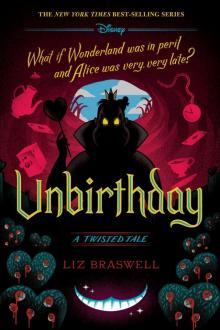 Unbirthday
Unbirthday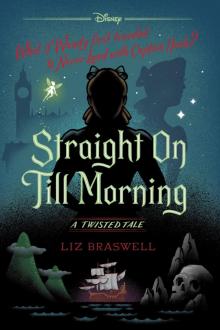 Straight On Till Morning
Straight On Till Morning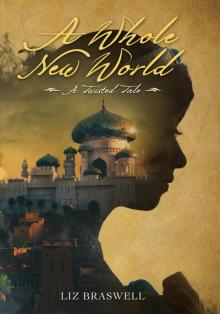 A Whole New World
A Whole New World Once Upon a Dream
Once Upon a Dream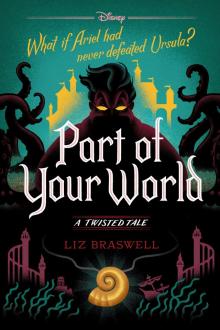 Part of Your World
Part of Your World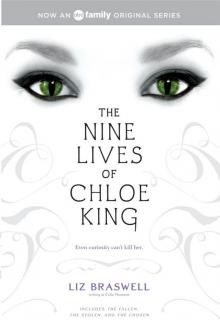 Nine Lives of Chloe King
Nine Lives of Chloe King The Fallen
The Fallen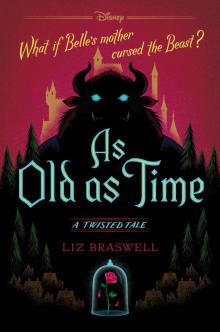 As Old As Time: A Twisted Tale (Twisted Tale, A)
As Old As Time: A Twisted Tale (Twisted Tale, A)